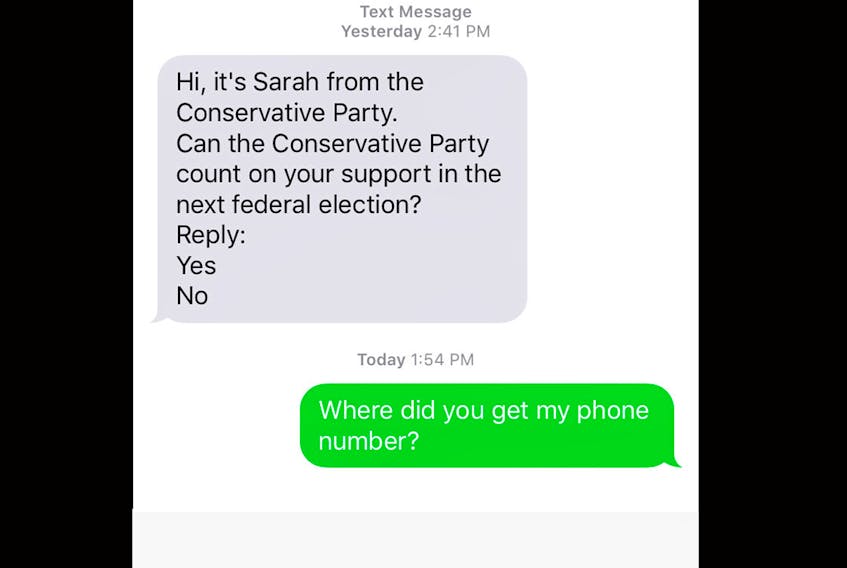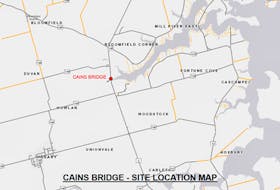Susan Doyle was more than just offended by the brief and suspicious-looking text asking if she’d support the federal Conservative party in the upcoming election.
The author identified herself only as Lisa and prompted the Guysborough resident to reply with either “yes” if she intended to support the Tories, or “no” if she wouldn’t. She received the text Wednesday evening and the following morning her husband got the same message.
"The Canadian Numbering Plan... makes public the first six digits of all phone numbers in Canada.”
- Cory Hann, director of communications, Conservative Party of Canada
“Our phone numbers are private information and I’m concerned how and where they accessed my private information,” said Doyle. “If they have my phone number, what other private information of ours do they have?”
The couple is among a slew of Nova Scotians being targeted by the Conservative party’s pre-election texting campaign. The messages are identical and are arriving from various Nova Scotia phone numbers. The sender is identified only by first name, such as Lisa and Sarah.
The private and the political

Wayne MacKay, a Dalhousie University law professor who specializes in privacy law, says recipients of these messages have good reason to be concerned about the security of their private information. Political parties are not subject to Canada’s Privacy Act. If they were, those texts would have to say how people’s phone numbers were gathered, at the very least, said MacKay.
“They’d have to explain at the beginning of the text how they got the information, that they’re acting in accordance of proper privacy protections,” said MacKay.
“But this is a matter of proper protocol and privacy protection. I still think they need to be giving this preamble, about how they got this information generally, that they have a privacy policy and its on their website and that the policy is in accordance with the legislation on such privacy matters. Therefore, you can proceed with comfort and reassurance.”
For years, Green Party of Canada Leader Elizabeth May has been lobbying to make political parties subject to the Privacy Act. Recent amendments to Canada’s Election Act offer additional protection in the way parties use people’s private information, such as requiring each party to have a privacy policy, showing they are transparent about how they plan to use data they collect. But it’s not enough, said May.
“I’m very concerned that we can’t get political parties to agree that we should be under the same privacy laws as non-governmental organizations, such as Oxfam Canada or Amnesty International,” said May.
“Unlike political parties, NGOs have to be super careful about not saving people’s information, unpacking information that you’ve collected from one petition to somewhere else in your organization, sharing that data or selling it to others.”
There’s a disturbing irony in government parties passing important privacy laws that they don’t follow themselves, said May.
“Why should people’s private information be less respected by political parties that want to form government, who passed the Privacy Act in the first place?” said May. “The double standard of political parties is quite something.”
Your digits are public
Cory Hann, Conservative Party of Canada’s director of communications, said the texting campaign is part of a cross-Canada canvassing effort to gauge people’s support for the party. Hann said the text canvassing started about two months ago but he couldn’t say how many Nova Scotians or Canadians have been targeted.
He said the party uses a combination of phone numbers people have voluntarily given the party “and using the Canadian Numbering Plan which makes public the first six digits of all phone numbers in Canada.”
Hann said the party uses “a program that randomly generates the final four digits, like other political parties elsewhere in the country have used.” Hann would not provide the name of the program.
“Of course, anyone who asks not to be contacted by text are respected, and their numbers are added to our internal do not contact list,” said Hann.
He said other information is not included in the text, such as telling the recipients where the party retrieved their number and that the unsolicited request for information follows the party’s privacy policy, because of limited space.
“Some text messages you can only send a certain amount of characters. So this is designed that we get as clear and straightforward a message out as possible.”
He likened the canvasing campaign to “21st-century door-knocking.”
“It’s done using technology rather than boots on the ground,” said Hann. “We’re trying to contact every Canadian we can through traditional methods: door-knocking or online and social media. Part of any party’s mandate is to reach as many Canadians as possible using as many means as we have.”
But MacKay said that’s not good enough.
“It’s very troubling,” said MacKay. “I think people at the very least require a full explanation and reassurance of how the party got their phone number and information and that they’re going to deal with that private information appropriately.”
RELATED:









